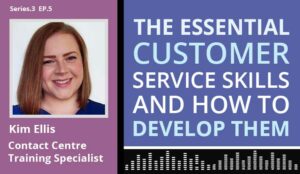Diane Banister discusses the importance of having contact centre coaches and mentors and highlights how to get the most out of yours.
Coaching is a win–win.
Get it right and it contributes to employee confidence and well-being, people engagement and job satisfaction and makes the customer experience better.
Develop a good coaching team, with sound coaching and mentoring practices, and you will see and feel the difference.
Why Is Coaching so Important?
Technology has revolutionised the delivery of training, with e-learning, micro-learning, YouTube videos. With an accent on self-managed learning, advisors increasingly have the option and freedom to find their own information from a series of resources.
But there is a limitation to this type of learning: it may tell us what to do but it doesn’t help us to actually apply the knowledge we have gained.
A surgeon joked with me before some surgery, “You’re OK, I’ve just looked at the latest YouTube video,” and that comment exposes the downside of the how-to videos.
How well can he put his knowledge into practice? Thankfully, he has more than a series of how-to videos to fall back on.
To some extent, the application of learning has always been the challenge of soft skills training. But with the technological advancement in training delivery, a good coach becomes crucial in helping to translate their understanding into the right kind of action to build skill. That, in turn, builds confidence and raises the quality of customer contact.
Find ways to make more time for coaching by reading our article: Being Super-Busy: The Modern Excuse for Not Coaching Staff
Development Programmes Must Understand the Role of the Coach
Any coaching development programme must be clear on the role of the coach within your centre.
Is it the role of a quality analyst? Of “scoring” objectively the quality of the customer contact, or are they there to help facilitate the development of the person they are working with?
Both coaching and mentoring centre around conversations that bring about a change in behaviour.
Both coaching and mentoring centre around conversations that bring about a change in behaviour. In a contact centre, coaching is often driven by the business need for quality, to ensure that:
- The customer experience is good
- The correct processes are followed
- Calls are handled appropriately and accurately
- Calls are handed according to the standards that you have in place.
Developing the Skills to Have Conversations That Bring About Change
There is a phrase that the “conversation is the relationship”.
This is true for conversations with customers. It is doubly true for coaching.
If coaching or mentoring is a conversation that creates change, then coaches need to be equipped to lead those conversations. This means that the coach needs to experience that process in their own learning.
Experiential Development Programme
Coaching skills training needs to be highly relevant and practical, because coaches worry about
- Their credibility with the people they will be coaching – how will the advisor react to and respond to them as coaches? Especially if they have been a peer.
- How to get advisors to engage with the coaching sessions, especially if morale is low on the floor.
- Where their role starts and ends, and where that overlaps with the responsibilities of a team leader.
- Building a coaching relationship so that advisors don’t just pay lip service to the coaching, saying the right things but not making any practical changes.
- What if there is no improvement in call evaluation scores after coaching – where does the responsibility lie?
- Out and out resistance from advisors.
The training that coaches experience needs to address these concerns and their real-world challenges and so must include meaningful insight, practice and review.
Developing Coaching Skills Takes More Than Training
Coaches need to understand the power of the coaching process and that helping someone to change their behaviour takes a depth of conversation that is more than feeding back some scores from a quality evaluation form.
At the heart of their development, coaches must develop the confidence in their own ability to lead and manage a coaching conversation which brings about the development of the person being coached.
Good coaches need to be able to
- Build advisors’ confidence across a variety of situations.
- Equip advisors with the necessary skills, and the focus to apply them in the real world.
- Assess the resourcefulness of the person they are working with and adjust their approach accordingly. Just as in sales conversations, if we are saying the same things to every customer we are not tuning in to the person we are talking with. This is amplified in coaching.
If a coach is going to have faith in their own coaching capability and the process that advisors go through, their own development must mirror that.
Find out how best to turn advisors into team leaders and coaches in our article: 10 Tips for Preparing Agents for Team Leadership
Real World, Live Issues
Quality coaches often have calibration or levelling sessions to ensure a consistent approach to customers and calls. These sessions can have even more depth if calls are discussed in terms of the best approach to coaching the advisors whose call has just been reviewed.
By working on live issues that are deeply rooted in the real world, coaches can widen the range of their coaching style.
One Size Doesn’t Fit All
As much as the customer service team has its finger on the pulse of the organisation and can tell you where the organisation is having challenges, coaches can take the temperature of the contact centre and the levels of motivation and job satisfaction.
Coaches are often working in the area of skill and will. Some advisors need to develop the skills to help customers listen effectively, to be helpful, to choose their words appropriately, to manage their own emotions when a customer is pushing their buttons.
Others have the skill, but for some reason, something is affecting their “will” to apply it, be that engagement, motivation, rebellion or something more personal.
A good development programme helps coaches to work with both skill and will.
A good development programme helps coaches to work with both skill and will, discussing their role and responsibilities in this area, and where that overlaps with the roles and responsibilities of team leaders.
Developing the Relationship with Team Leaders
This relationship can be both interesting and challenging.
Some will be grateful for the extra support. Some will “dump” the more challenging situations and people on to the coach and expect a result where they have not been able to achieve one. Some will feel threatened by the coach. Part of the coach’s development needs to address how to consult with team leaders and agree the level and appropriateness of coaching support.
For a coach and therefore coaching to be credible, they have to have credibility with the management team. Building their personal reputation is crucial and a development programme can help with this.
Where coaches and team leaders work together, magic can happen. Where they don’t, underperforming advisors can play one off against the other.
Who Coaches the Coaches?
Any coaching programme has to include coaching for the coaches. Having someone observe and coach coaching sessions demonstrates that the coach believes in coaching. This speaks volumes to the advisors being coached. It also enables the coach to experience coaching, and to internalise the impact it has.

Diane Banister
Not only that, it will model what good looks like in a good coaching session, both supporting and challenging the coach in their own development. This informs their own sessions as a coach and can help avoid any coaching ruts they find themselves in.
Where do coaches go for support in your organisation when they need to think through the best approach to a situation or a particular person they find challenging?
Providing this level of support, insight and depth of learning is key if you want to see a return on investment (ROI) from your coaching activity.
Have we missed any advice for getting the most out of a contact centre coach?
Please let us know in an email to Call Centre Helper.
This article was written by Diane Banister, the Founder of Intelligent Dialogue, a training and development consultancy that specialises in customer contact.
Author: Robyn Coppell
Published On: 14th Mar 2018 - Last modified: 5th Feb 2025
Read more about - Call Centre Management, Coaching, Soft Skills, Team Management, Training
















